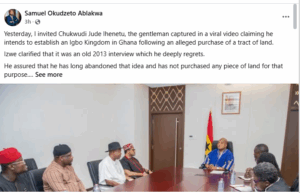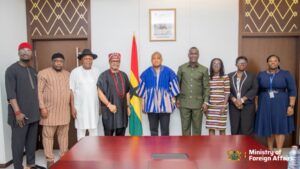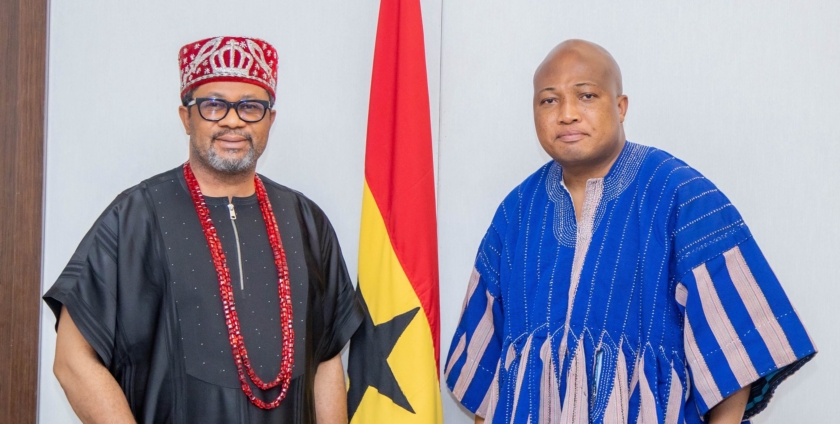adverts
The Minister for Foreign Affairs, Samuel Okudzeto Ablakwa, has issued a strong diplomatic warning to Nigerian national Chukwudi Jude Ihenetu following viral claims of plans to establish an “Igbo Kingdom” in Ghana.
In a statement made via Facebook on Wednesday, July 17, the minister addressed public uproar over a resurfaced video in which Ihenetu discussed acquiring land in Ghana to create a sovereign Igbo settlement with a monarchy. The footage, though dated, triggered sharp backlash from Ghanaians, traditional leaders, and political stakeholders, who viewed the remarks as a direct affront to Ghana’s sovereignty and chieftaincy traditions.

adverts
Minister Ablakwa revealed that he had summoned Ihenetu to a meeting to clarify the claims. During the engagement, Ihenetu admitted the video was recorded in 2013 and expressed deep regret over the statements, stressing that he had long abandoned the idea and never acquired land for such a venture. He further conveyed what the minister described as “profuse apologies” to the president, government, traditional authorities, and people of Ghana for the “unfortunate agitations” the interview caused.
Reiterating Ghana’s foundational values, Mr Ablakwa stated,
“Ghana is exceptionally proud of its celebrated friendly foreign policy, which is welcoming of all to our beautiful and peaceful country, particularly Africans and people of African descent. We are determined to keep championing that Pan-African identity, for which we have attained global renown.”
However, he added a stern reminder:
“We expect all our fellow Africans and guests to adhere to our peaceful and law-abiding traditions and desist from conduct or pronouncements considered unlawful, divisive and incendiary.”
The minister’s caution reflects deep legal and constitutional concerns. While Ghanaian law permits foreigners to lease land—typically for up to 50 years renewable—it prohibits non-citizens from acquiring freehold ownership (Article 266 of the Constitution and Section 10 of the Lands Act, 2020 [Act 1036]). Moreover, any attempt to establish a parallel monarchy or kingdom contravenes the Chieftaincy Act, 2008 (Act 759), which governs the recognition and installation of chiefs under Ghana’s traditional governance framework.

Though Ihenetu’s clarification may have diffused immediate tensions, the incident resurfaced long-standing sensitivities in Ghana-Nigeria relations. Notable historical flashpoints include:
- The 1969 Aliens Compliance Order, issued by Ghana under Prime Minister Kofi Abrefa Busia, which expelled hundreds of thousands of undocumented foreign nationals, many of whom were Nigerian.
- The 1983 “Ghana Must Go” episode, during which Nigeria expelled over one million Ghanaians amid an economic crisis and accusations of rising crime and job losses.
- Recent trade disputes, which saw tensions over the enforcement of Ghana’s retail trade laws and the Ghana Investment Promotion Centre (GIPC) Act. Local traders have frequently clashed with Nigerian shop owners, accusing them of unfairly dominating Ghana’s retail space.
These historical tensions—though not defining—highlight the delicate nature of diplomatic relations between the two West African giants, both of whom share deep cultural, economic, and political ties but are occasionally rattled by nationalist sentiments and legal controversies.
Click the link Puretvonline.com | WhatsApp Channel to join the WhatsApp channel
GOT A STORY?
Contact/WhatsApp: +233243201960 or Email: manuelnkansah33@gmail.com


